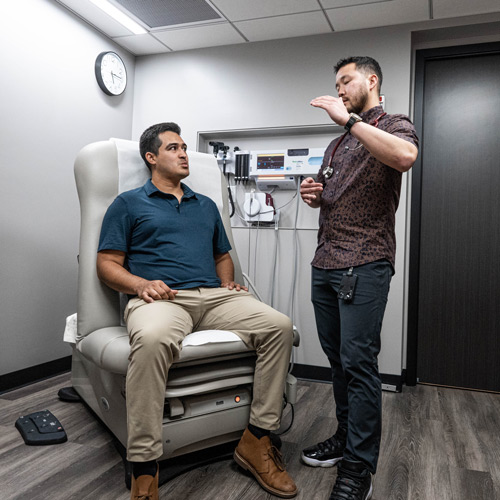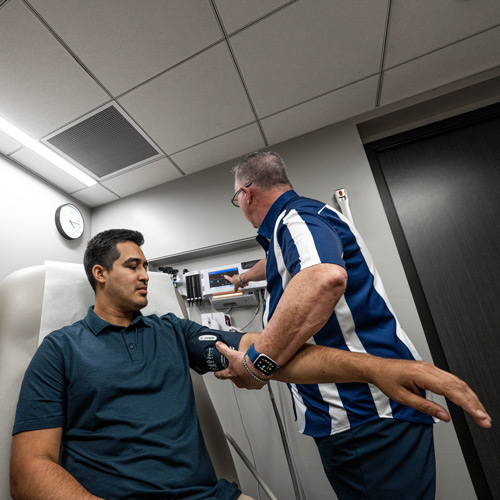
Clinical Corner
Quality Primary Care: Doctors and Nurse Practitioners
Types of Primary Care Providers
Think of a Primary Care Provider (PCP) as your go-to healthcare person. They’re the provider you’ll see most often and usually over the longest span of time for things like annual checkups, sick visits, and preventive care. They can also help you diagnose, treat, and manage any chronic conditions, as well as help coordinate care with your Care Team. Basically, whenever you have a health issue, they’ll be your first stop.
There are a few different kinds of providers who practice Primary Care. They all get similar training and hands-on experience with patients and they tend to focus on whole person wellbeing.
Doctor of Medicine (MD) and Doctor of Osteopathic Medicine (DO)

Physicians who have graduated from medical school and completed residency training.
Nurse Practitioner (NP)

Nurse Practitioners are registered nurses with advanced training and licensing. They provide comprehensive services including diagnosis, management, and treatment of conditions. They often work in collaboration with physicians.
Physician Assistant (PA)

Physician Assistants are healthcare professionals licensed to practice medicine under the supervision of a physician. They provide a wide range of services including diagnosis, treatment plans, and prescriptions.
Quality of Care from MDs and NPs
So what’s the difference in care between the various types of Primary Care Providers? NPs and PAs are far more similar to MDs and DOs than most people realize. They all take a patient-centered approach that is focused on prevention, education, and whole-person wellbeing. And they’re all qualified to:
Many studies have even proven that the clinical outcomes between different types of Primary Care Providers are statistically similar across cost, quality, and care.
Crossover’s Approach to Care
Crossover’s Advanced Primary Care model gives each member a dedicated Care Team that includes providers across multiple specialties. The providers focus on prevention and whole-person wellbeing and work together to help members live their healthiest lives. Our collaborative, holistic approach allows our members to build trusted relationships with their providers. And by offering a range of Primary Care Providers who all deliver the same high-quality care, our members can access the care they need quickly and easily from the same team, every time.
How to Choose the Right Provider for You
The main thing you’ll want to consider when choosing your Primary Care Provider is whether you feel you can build a trusted relationship, since the goal is to have an ongoing, open, and collaborative conversation about your health needs, issues, and goals.
Some things to keep in mind:
- You can always set up a preliminary visit with any potential providers. Use this as a chance to “interview” them and see if it’s a good fit for you.
- Think about the kind of relationship you need to be able to build trust and work together long term on your health, any chronic or acute conditions, and goals.
- Appointment wait times, locations, and general accessibility:
- NPs/PAs may be available sooner than physicians
- Increased accessibility of NPs/PAs means faster and more frequent care which can reduce the need for hospitalization and ER visits
- Quality of care:
- NPs/PAs are trained to provide high-quality, comprehensive Primary Care
- You can expect to receive excellent Primary Care from an NP or PA, just as you would from a PCP
Need Primary Care services?
Log in to your account, choose “Get Care”, then select “Schedule a visit” to book an appointment with a Crossover provider today.
Frequently Asked Questions
What are the main types of Primary Care Providers?
The main types of Primary Care Providers are Doctors of Medicine (MDs), Doctors of Osteopathic Medicine (DOs), Nurse Practitioners (NPs), and Physician Assistants (PAs).
What is a Primary Care Provider (PCP)?
A Primary Care Provider (PCP) is your go-to healthcare provider who you’ll see most often for things like annual checkups, sick visits, and preventive care. They can help diagnose, treat, and manage any chronic conditions, and coordinate care with your Care Team.
What services can Primary Care Providers offer?
Primary Care Providers can prescribe medications, make referrals, order and interpret tests, diagnose and treat conditions, and provide high-quality, cost-effective care.
How does Crossover’s approach to care differ?
Crossover’s Advanced Primary Care model gives each member a dedicated Care Team with providers across multiple specialties, focusing on prevention and whole-person wellbeing.
How can I choose the right Primary Care Provider for me?
Consider factors like building a trusted relationship, appointment availability, locations, and the type of provider that best fits your healthcare needs and goals.
What should I look for in a long-term relationship with a Primary Care Provider?
The key is finding a provider you can build an open, collaborative relationship with to work together on your health needs, issues, and goals over the long-term.
